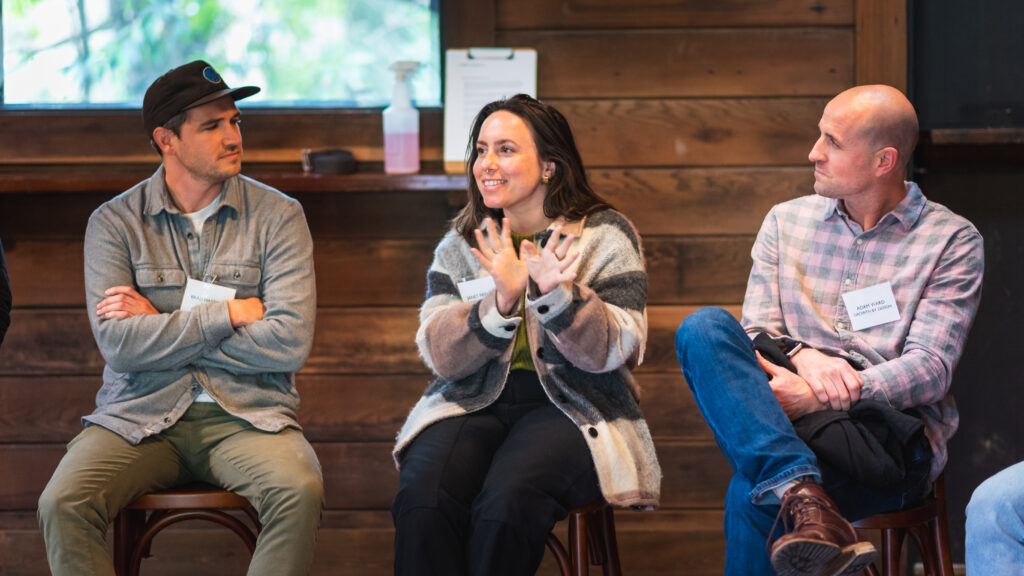
Talent
Janet
Frishberg
Janet works with high-growth organizations and leaders, from the seed stage to public companies, helping them put in place thoughtful systems for hiring great people.
Janet started her career in technical recruiting, growing the engineering team at Airbnb from under 100 to just over 1,000. She also co-founded Equity for Impact to inspire and enable tech employees to donate a portion of their stock proceeds to charity, which now includes over $1.7 billion pledged by participants. Janet holds a BA from UC Berkeley in Psychology, with a minor in Sustainable Food Systems.
closeTurning Values Into Actions to Build Teams with Purpose
Janet shares how companies can ensure that their team’s DNA will drive their mission. She discusses building systems that enable impactful teams in a conversation with Kristen, Gigascale’s Head of Communications.
Tell me about your career and finding your way to climate tech.
I became aware of the climate crisis in college but never found a way to plug it in until recently. It’s always been on my radar when the question of meaning at work came up. It’s the most important thing facing humanity today. Everything else that you might care about will be tough to progress if we don’t have a climate that’s livable and predictable to some extent for humans.
I started my career in a nonprofit during the 2009 recession, helping job seekers and coaching them on interviewing skills. At a certain point, I wanted to move into a company and get experience hiring people. I ended up in technical recruiting at Airbnb in the very early days when people didn’t even know how to say the name of the company. By the time I left, I had grown the engineering team from about 100 people to over a thousand and touched everything from university recruiting to data infrastructure, mobile, and leadership hiring within engineering.
From there, I joined Growth By Design, where I coach companies at inflection points. Now, I’m focused on supporting climate tech startups on talent strategy at Gigascale. Until this opportunity with Gigascale, most of the recruiting roles in climate tech I’ve seen have been in technical recruiting for software companies, which is just a tiny sliver of the work that needs to be done. Gigascale is uniquely approaching talent strategically, which means I can bring a much more holistic perspective to companies beyond just getting people into the hiring pipeline for a role or two.
Can you share more about your approach to recruiting and talent?
I have a learning and development background and do a lot of direct work with founders, coaching and mentoring them. I really enjoy the teaching aspect of what I get to do. No matter the company’s stage, I use core values as guideposts because those are what create a place’s culture.
In the early days, seed to Series A, I’m working with the founding team, who might have made one or two hires but need to start thinking about lightweight systems and how to recruit for roles where they don’t have direct expertise. Later, they’ll have other team members who can evaluate within their spheres of excellence. Still, as a founder doing most of the hiring early on, you have to figure out how to assess people outside of where you might be a subject matter expert.
Around Series B, C, and maybe even D, there’s an inflection point where the systems and processes you set up in the early days might not work well anymore, and we need to tweak or re-haul them for continued scaling. That’s another time when I often work with companies to help them make changes.
We talk about core values a lot. How do you make them actionable from a talent lens?
I was really shaped by Airbnb’s use of core values. There was a deep commitment to them when I was there; everyone felt responsible for reflecting if we missed the mark. And when we did, there was a real reckoning to understand what happened and what to do differently in the future.
For teams doing core values for the first time, the biggest thing is that yours should feel different from another company’s values. What tends to happen is that people draw on the core values of the last place where they worked, which they’re also often hiring a lot of people from. Then, the new place feels like a slightly different version of the old place. Versus actively deciding what DNA this new company needs in order to achieve its mission, and getting specific about what that looks like, and how people embody the values in a day-to-day way.
I also see that founders have things in their heads that they’re looking for in people but haven’t made them explicit or clear to everyone else at the company. Then the founders become the gatekeeper of culture at their company; that doesn’t work at scale. Values work at its most basic level is about making the implicit explicit and, especially if there are multiple founders, coming to a consensus.

How can you tell if core values are working or not?
Core values or operating principles should be both aspirational and realistic. It’s normal for there to be tension, but you shouldn’t set impossible expectations because employees will reject them as lofty and unrealistic. Then, they will end up as platitudes on a wall.
Another signal is that you’ll end up experiencing unstated differences as inefficiencies in your hiring process. One symptom of this is that you have disagreements on candidates at late stages in the process. That candidate represents something more philosophical or fundamental that you need to get on the same page about as a hiring team.
When it’s working, you can feel it. A place feels different. People are paddling in the same direction. The values then aren’t things just plastered on a wall or in a document that’s shared at all-hands meetings, but these are actual behaviors, how people show up, act, and treat each other at work. The sum of all that creates culture at a company.
If a small team is busy and waits to do this work, are they screwed?
Earlier is better. But there are a lot of inflection points when you can do values work as a company and it will make a huge impact! I know how hard it is to take time for this when you’re actively hiring, and then as soon as you hire for those roles there are other priorities to focus on. But this work is foundational, and it’s not like you do it once and it’s done forever — it’s a living document that you’ll revisit periodically.
I like to teach founders how to move from an idea of a value into a competency and a definition that you can assess for in the hiring process. That way, it’s put into practice immediately and doesn’t feel like extra work on top of an already-packed to-do list.
In practice, it’s also more useful to have a couple of clear anchors rather than an exhaustive list of twenty potential attributes. Give yourself fewer things to focus on and measure against.
How do you stay motivated and grounded while working in climate tech?
Just taking time to be in the physical world. I’m lucky to have close friends living right on my block. So, if things get really heavy from reading upsetting news or learning about dire climate impacts, I have people to physically turn to. It’s been important to keep this close sense of community while living in an urban environment.
One last question. What do you think the world will hopefully look like in a decade?
When we genuinely want to and can find ways to work together, people can accomplish amazing things in a short amount of time. There will always be diverse perspectives on what needs to be done. Still, collectively, we need more people putting their energy into this work in a concerted way. I hope we see people from all walks of life dedicating themselves to being part of the solution.
Janet’s Go To Resources
I’m going to plug books! Two related to climate that have stuck with me over the years are Kim Stanley Robinson’s “The Ministry for the Future “and adrienne maree brown’s “Emergent Strategy”. Also, I listen to well reported podcasts like The Ezra Klein Show.



